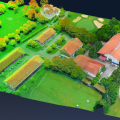
One of Google Maps Mania’s ‘Maps of the week’ is from the Melbourne Writers Festival, and is entitled ‘Stories Unbound.’ It’s actually created in tandem with an iPhone app that allows the user to read – and write – stories with a geographical context. The stories appear on the map for browsing. Cartographically, I think it’s a great looking map, too.
What do you love more than GIS? Free GIS stuff, of course! In this case, it’s a list of free e-books. We mentioned the National Academies Press books back in June but there are a few more on the list worth checking out, especially if you have a tablet on which to read them.
Between the Poles talks about the benefits of open data from an Australian governmental perspective.
SlashGeo points us to an thought-provoking piece that talks about a new Westfield smartphone app that allows users to find their car in the car park. These apps usually require the user to geotag their car’s location before they leave, then simply guide you back to it, but this one differs. You see, the shopping centre photographs and records every license plate in the car park, so the user only has to type in their license plate number to be guided to their parking space. Creepy, no? I think I prefer the GPS method, thanks.
Here’s an interesting piece by iRevolution that looks at the way that crowdsourcing was used during WWI. There are some great links in the comments, too, so be sure to look at them.
A New York Times writer tells the tale of a cycle accident he had, and how he used his GPS tracker to recreate the fall, of which he had no memory of.
Got Geoint? tells us of a way that GPS could be used to detect the small atmospheric disturbances caused by underground nuclear testing, helping identify when ‘rogue’ states are doing naughty things with nuclear technology.
And, finally, GeoSpatial World informs us that UK Scientists are going to try and revive the UK’s first satellite, which was launched in 1971, and is still in orbit, although it hasn’t been contacted since 1996.







